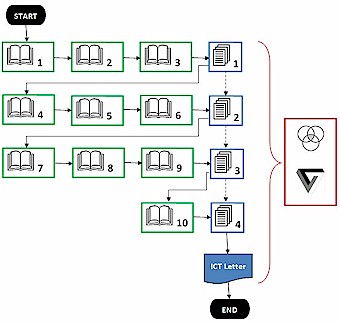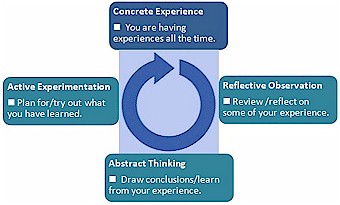OVERVIEW
The Integrative Critical Thinking Toolkit is a collection of resources that will support you in developing the intellectual flexibility and adaptability necessary for prudent decision-making and action in the 21st century.
The Toolkit's resources will help you to integrate critical thinking concepts, theories, and methods with your own experience. With these resources, and through continuing reflection on your personal experience, you can develop the habits of strong critical thinking. This kit supports integrative learning — making connections among concepts and experiences so that information and skills can be applied to novel and complex issues or challenges. (1)
Integrative critical thinking (ICT) employs logical ideas and methods for addressing topics, issues, problem areas, or human challenges that currently confront us or are likely to emerge in the future. With ICT, you will be able to confront tomorrow's surprises and challenges with confidence and effective action.
Following our ICT learning path, ICT will support you in developing habits of self-reflection and self-assessment. You will be able to demonstrate your CT progress in a brief letter about an issue or problem of your choosing and from your point of view.
Your success in learning how to become a better critical thinker depends on using this toolkit's resources and your diligence in staying on our learning path:


Using the Study Guides
Instructions
► Save and/or print the Adobe Acrobat files to fit your needs.
► Focus on comprehension (understanding the meanings of key terms).
► Memorize the key terms that are marked accordingly.
► Study each of these guides in the sequence listed below.
► Study with your utmost gusto!
| Links (Adobe Acrobat files) |
| 1. Arguments & Issues |
| 2. Assumptions & Values |
| 3. Categorical Logic |
| 4. Propositional Logic |
| 5. Inductive Logic |
| 6. Informal Fallacies |
| 7. Using Language |
| 8. Using Media |
| 9. Listening & Reflecting |
| 10. Facing Tomorrow |
Using the Worksheets
These worksheets will help you demonstrate your comprehension of basic concepts and procedures, and how well you understand the ways they can be integrated in your life
It is not necessary to memorize the definitions of most key terms. But it is very important that you understand the meanings of these terms. By reflecting on your own ability to use the language of logic correctly, you will discover new ways to become a better critical thinker.
Instructions
► Save and/or print the Microsoft Word files to fit your needs.
► Find a place that is quiet and comfortable.
► Turn off your phone, radio, television, or other media device.
► Eliminate all distractions if possible.
► Study with your utmost gusto!
| Links (MS Word files) |
| S-R Cycle Worksheet |
| Skill Worksheet 1 |
| Skill Worksheet 2 |
| Skill Worksheet 3 |
| Skill Worksheet 4 |
Using the Self-Reflection Cycle Worksheet
Self-reflection is a necessary habit for critical thinkers. To be a strong critical thinker means to habitually reflect on, and evaluate one's experience. The process of self-reflection can be envisioned as a continuous learning cycle grounded in a person's experience:

Many of our concrete experiences are noteworthy in some respect. Only you can say what might call for self-reflection at any given time. Only you know the people or situations or things that come to mind when you are thinking about how your day is going, or how it went. Often, the focus should be on a revisiting of some experience that may not have gone as well as you expected or wanted.
When you move into abstract thinking, interrogate your attitudes, assumptions, beliefs, and values that were involved in the experience. This is a difficult stage because it requires deep personal honesty and courage to face unpleasant truths about ourselves. By unmasking assumptions and clarifying your values, you can draw new conclusions about your life and where you want to go with your new insights.
New insights can lead to new plans for how you might capitalize on a strong skill, solve some personal problem, improve a relationship, foster social change, or contribute to your community and world.
Note
Self-reflection requires mental focus and personal honesty. Silence is very important. You must be able to hear your inner voice. Completing a Skill Worksheet requires self-reflection.
- ► Find a place that is quiet and comfortable.
- ► Turn off your phone, radio, television, or other media device.
- ► Eliminate all distractions if possible.
1. Critical Thinking Principles
5. Evaluating Deductive Reasoning
Thank you.
Thank you for checking references carefully.
Citation Tools
You can use an online text formatting tool like EasyBib for constructing citations (footnotes) for an ICT Letter.
References
Some material in the Integrative Critical Thinking Toolkit is based on, or adapted from material originally published elsewhere. Extended quotes are noted in quotation marks or as indented or highlighted text.
Carey, Stephen. A Beginner's Guide to Scientific Method. 4th ed., Wadsworth-Cengage Learning (2012).
Conway, David A. and Ronald Munson. The Elements of Reasoning, 3rd ed., Wadsworth/Thomson Learning (2000).
Diestler, Sherry. Becoming a Critical Thinker: A User Friendly Manual; 6 th ed., Pearson/Prentice-Hall (2012).
Hurley, Patrick and Lori Watson. A Concise Introduction to Logic, 13th ed., Wadsworth-Cengage Learning (2018).
Kahane, Howard. Logic and Philosophy, Wadsworth Publishing Company, Belmont, CA (1969).
Moore, Brooke N. and Richard Parker. Critical Thinking, 4th ed., Mayfield Publishing Company, Mountain View, CA (1995).
Schick, Theodore Jr. and Lewis Vaughn. How to Think About Weird Things, Mayfield Publishing Company, Mountain View, CA (1995).